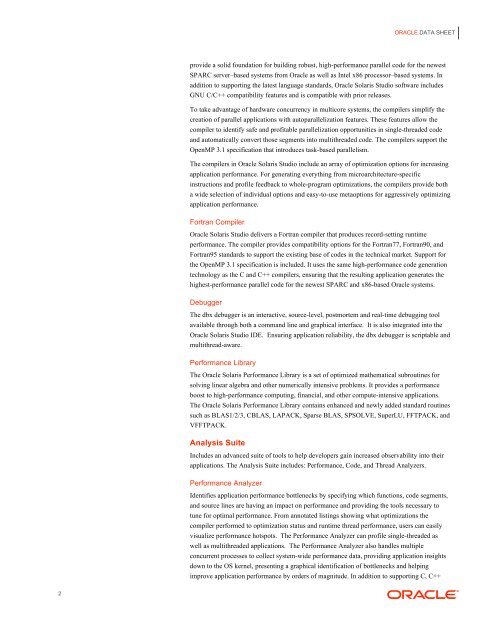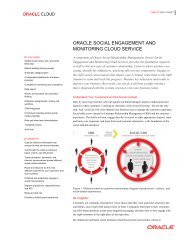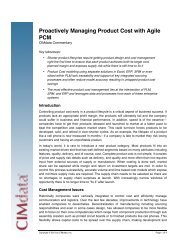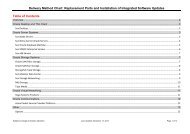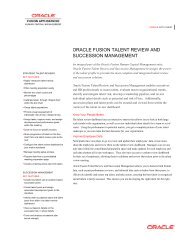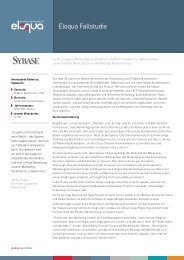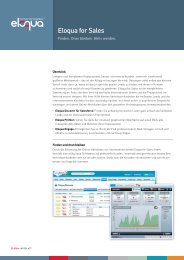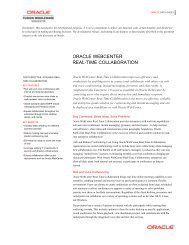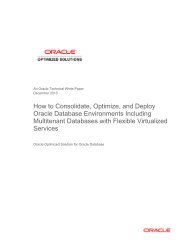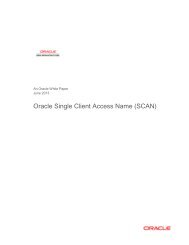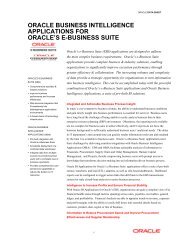Oracle Solaris Studio 12.3 Datasheet
Oracle Solaris Studio 12.3 Datasheet
Oracle Solaris Studio 12.3 Datasheet
You also want an ePaper? Increase the reach of your titles
YUMPU automatically turns print PDFs into web optimized ePapers that Google loves.
ORACLE DATA SHEET<br />
provide a solid foundation for building robust, high-performance parallel code for the newest<br />
SPARC server–based systems from <strong>Oracle</strong> as well as Intel x86 processor–based systems. In<br />
addition to supporting the latest language standards, <strong>Oracle</strong> <strong>Solaris</strong> <strong>Studio</strong> software includes<br />
GNU C/C++ compatibility features and is compatible with prior releases.<br />
To take advantage of hardware concurrency in multicore systems, the compilers simplify the<br />
creation of parallel applications with autoparallelization features. These features allow the<br />
compiler to identify safe and profitable parallelization opportunities in single-threaded code<br />
and automatically convert those segments into multithreaded code. The compilers support the<br />
OpenMP 3.1 specification that introduces task-based parallelism.<br />
The compilers in <strong>Oracle</strong> <strong>Solaris</strong> <strong>Studio</strong> include an array of optimization options for increasing<br />
application performance. For generating everything from microarchitecture-specific<br />
instructions and profile feedback to whole-program optimizations, the compilers provide both<br />
a wide selection of individual options and easy-to-use metaoptions for aggressively optimizing<br />
application performance.<br />
Fortran Compiler<br />
<strong>Oracle</strong> <strong>Solaris</strong> <strong>Studio</strong> delivers a Fortran compiler that produces record-setting runtime<br />
performance. The compiler provides compatibility options for the Fortran77, Fortran90, and<br />
Fortran95 standards to support the existing base of codes in the technical market. Support for<br />
the OpenMP 3.1 specification is included. It uses the same high-performance code generation<br />
technology as the C and C++ compilers, ensuring that the resulting application generates the<br />
highest-performance parallel code for the newest SPARC and x86-based <strong>Oracle</strong> systems.<br />
Debugger<br />
The dbx debugger is an interactive, source-level, postmortem and real-time debugging tool<br />
available through both a command line and graphical interface. It is also integrated into the<br />
<strong>Oracle</strong> <strong>Solaris</strong> <strong>Studio</strong> IDE. Ensuring application reliability, the dbx debugger is scriptable and<br />
multithread-aware.<br />
Performance Library<br />
The <strong>Oracle</strong> <strong>Solaris</strong> Performance Library is a set of optimized mathematical subroutines for<br />
solving linear algebra and other numerically intensive problems. It provides a performance<br />
boost to high-performance computing, financial, and other compute-intensive applications.<br />
The <strong>Oracle</strong> <strong>Solaris</strong> Performance Library contains enhanced and newly added standard routines<br />
such as BLAS1/2/3, CBLAS, LAPACK, Sparse BLAS, SPSOLVE, SuperLU, FFTPACK, and<br />
VFFTPACK.<br />
Analysis Suite<br />
Includes an advanced suite of tools to help developers gain increased observability into their<br />
applications. The Analysis Suite includes: Performance, Code, and Thread Analyzers.<br />
Performance Analyzer<br />
Identifies application performance bottlenecks by specifying which functions, code segments,<br />
and source lines are having an impact on performance and providing the tools necessary to<br />
tune for optimal performance. From annotated listings showing what optimizations the<br />
compiler performed to optimization status and runtime thread performance, users can easily<br />
visualize performance hotspots. The Performance Analyzer can profile single-threaded as<br />
well as multithreaded applications. The Performance Analyzer also handles multiple<br />
concurrent processes to collect system-wide performance data, providing application insights<br />
down to the OS kernel, presenting a graphical identification of bottlenecks and helping<br />
improve application performance by orders of magnitude. In addition to supporting C, C++<br />
2


